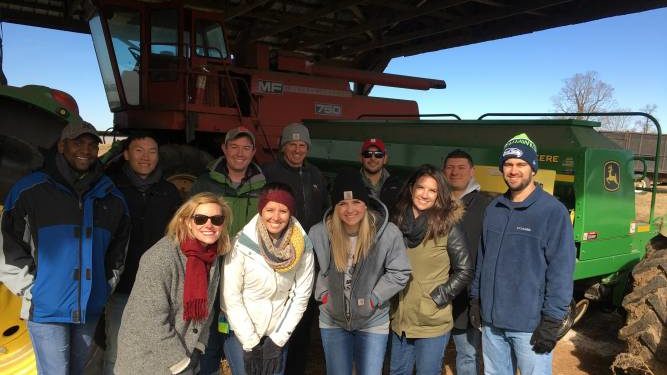Jenkins MBA Students Study Opportunties in Organic Production

At the close of the 2016 fall semester, a group of Jenkins MBA students and representatives from the Supply Chain Resource Cooperative (SCRC) had the opportunity to tour one of Organic Valley’s organic dairy farms right here in North Carolina. The farm, Lindale Organic Dairy, is located in Snow Camp, NC, and has been in the family for generations. The tour was led by Gerry Cohen, Organic Valley’s Southeast Region Pool Manager, and Neal Lindley, the owner and farmer of Lindale Organic Dairy.
Organic Valley is America’s largest cooperative of organic farmers and operates across the United States supplying organic milk, cheese, and other dairy products. The cooperative was organized in 1988 and currently represents more than 1,800 farmers in 36 states. With a long history of supporting and in many cases, saving family farms, Organic Valley is well known in the industry and is one of the nation’s leading organic brands.
“The tour was a great opportunity for students, faculty, and staff to see how organic milk is produced and understand the business side of organic farming and operating a national cooperative,” said Graham Givens. Givens, a Supply Chain Resource Cooperative (SCRC) Supply Chain Scholar that works with the Center for Environmental Farming Systems (CEFS), organized the tour as a way for MBA students to understand the real business opportunities of organic production and products.
The students and representatives learned a great deal about Organic Valley and the cooperation between the company and the farmers. Organic production takes a large, upfront investment for farmers who have to leave their land fallow for three years after conventional production to allow any non-organic fertilizer and other additives to leave the soil. Organic Valley partners with farmers and gives them financial support during this time to reduce these upfront costs. This is a significant step for any company to take and really demonstrates Organic Valley’s commitment to building lasting relationships with farmers.
Even with these upfront costs, Neal related that his move to organic production was a smart business move for his farm. He saw his input cost (fertilizer, gas, equipment) continually increasing in conventional production while his output stayed about the same or decreased. With organic production, Neal can now let his land naturally produce feed for his cows while almost eliminating the need for significant inputs. Neal also understands that his switch to environmentally conscious organic milk production has lasting positive impacts on the land that the farms and the community that he serves.
The tour also offered a glimpse of a different business model than most national companies. As a cooperative, the farmers own shares in the company and benefit directly from the success of the company. Farmers in the cooperative are the decision making body for the company, which is drastically different from many large food companies.
Dana Magliola, Director of the SCRC, had this to say about the tour: “The tour of the Lindale Organic Dairy was eye-opening for students and everyone who attended. After seeing first-hand how closely farmers work with the Organic Valley cooperative, it was very clear that this national organization prioritizes its engagement with farmers and the communities in which they operate. For the students who organized and attended the tour, it was an excellent, hands-on learning opportunity.”
All attendees greatly appreciated this opportunity to learn more about Organic Valley and organic production and thank Organic Valley for their time, and the Supply Chain Resource Cooperative for their generosity in providing transportation.
- Categories:


